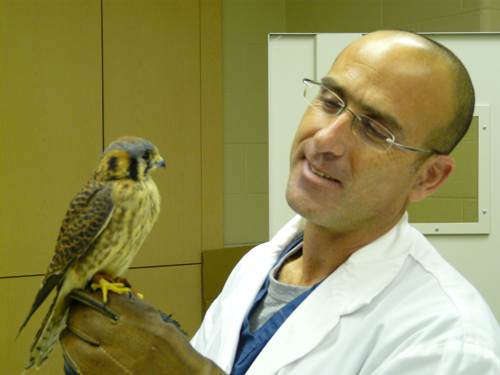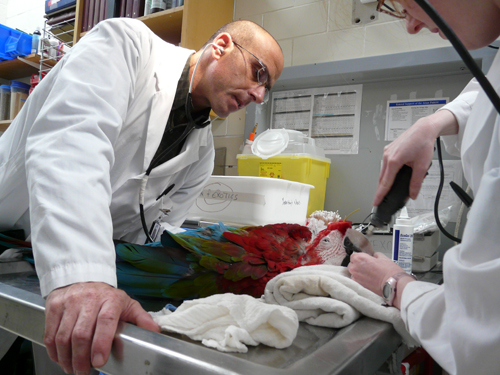
“Every day in my clinic is like a visit to the zoo,” says David Eshar, a new veterinarian at the Ontario Veterinary College Health Sciences Centre. While cats, dogs and livestock make up the majority of most veterinary practices, Eshar specializes in birds, reptiles and other exotic pets.
On this particular afternoon, he’s just finished overseeing work on a guinea pig’s overgrown molars; next he will be treating a gecko and later a hawk. On other days, Eshar has provided care for a serval cat, a baby lion, lizards, snakes, tortoises and many birds. “Parrots are a significant percentage of our clients,” says Eshar, whose position is funded in part by a donation from Rolf C. Hagen Inc.
Eshar, who was born and raised in Israel, has always been interested in these less-common animals. “As a child I had all kinds of animals as pets. When I start vet school, I would go to the Jerusalem Biblical Zoo on weekends to help out and learn more about the different animals.”
After his graduation, Eshar went into private practice as a veterinarian, treating dogs and cats as well as exotic pets. “I found I was seeing quite a few exotic animals, because most vets didn’t want to work with them, so they’d send clients to me,” he recalls. Since working with these animals appealed to him, Eshar decided to apply for an internship in exotic animals at Tufts University in Massachusetts. After completing that, he spent two more years doing a residency at the University of Pennsylvania, again with a focus on exotic animals.
“With these new skills, I returned to Israel and worked as a private consultant to vets, zoos and research institutes,” says Eshar. However, he found that type of work somewhat isolating. “I like the benefits of working with other specialists. The level of care you can provide is much higher when you have those resources.”
In addition, Eshar enjoys teaching and feels it is important to pass on his expertise in exotic animals to new vets.
“Most vets who open small animal practices will get some exotics brought in to them,” he says. “They need at least the basic information about how to approach the animal, how to handle it, how to treat common problems.”
Specializing in birds and exotic pets, he admits, is a professional challenge. “You need to know so much about the anatomy and physiology of each species and the different diseases that can affect them.” Adding to the challenge is that less research is done on these species compared to the abundant research available on cats and dogs, so it can be harder to determine the best plan of treatment.

Eshar says his toughest cases involve large parrots who pluck out their own feathers to the point of mutilation. “We want to make these birds better; their owners want them to be better, but there is a psychological background to this condition that makes it hard to correct,” he explains. “Parrots are so socially demanding that even when their owners are making every effort to keep them properly, they may not be meeting their psychological needs.”
One area of professional focus for Eshar is standardizing the approach to diagnosing medical conditions in exotic species. “I want to take what is known to us in well-studied animals, such as cats and dogs, and see what can be applied to these less-studied species, with attention to the differences in anatomy and physiology.”
Adapting to life in Canada has been “not too bad” says Eshar, especially since he and his family (he has three sons, ages 11, eight and two) had previously lived in the United States. He does admit that it was tough to move from the mild Israel winters to Canada in January. “In Israel, if you get a centimetre of snow, everything just stops,” he says.
That change has been worth it, though, to work in what Eshar sees as a facility offering the best specialized medical care for owners and pets.
In his free time, he plays soccer and runs marathons. “I look at my vet career the way I do long-distance running,” he says. “You have to set up a plan and work hard to achieve it.”
And what exotic pets does Eshar have at home? An ordinary domestic cat. “He was a feral cat who jumped on us from a garbage can on our first day back in Israel after my studies in the U.S. Now he’s part of the family, so of course we brought him with us.”